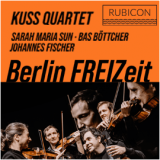Nach seinem Beethoven-Zyklus mit dem zeitgenössischen Gruß von Bruno Mantovani an den Jubilar widmet das Kuss Quartett nunmehr eine gesamte CD neuen Kompositionen. Dabei handelt es sich um Auftragsarbeiten für Freunde des Quartetts. Die die Quartettformation erweiternden Mitwirkenden sind ebenfalls langjährige Vertraute. Da die Aufnahme am Wohnort der Quartettmitglieder und in Corona Zeiten entstanden ist, liegt der gedankliche Ansatz zur Freizeit nahe.
Enno Poppe hat ein titelgebendes Stück beigesteuert, das luftig leicht gedacht ist und bei dem auch das Umblättern für die 14 Variationen zur Komposition gehört. Aribert Reimann hat für seinen Zyklus ‘Die schönen Augen der Frühlingsnacht‘ sechs Lieder von Theodor Kirchner nach Gedichten von Heinrich Heine für Sopran und Streichquartett gesetzt. Hier werden sie durchmengt von den sieben Bagatellen für Streichquartett, die subversiv mit den Augen der Frühlingsnacht in Beziehung stehen. Manfred Trojahn hat sein 5. Streichquartett ausgehend von früheren Werken geschaffen. Es beschäftigt sich mit der Frage der Erschaffung von Kunst gegenüber und inmitten der realen gegenwärtigen Welt.
Cage wählte für die Vertonung von ‘The Wonderful Widow of Eighteen Springs‘ eine Passage aus Finnegans Wake von James Joyce. Die Gesangslinie verwendet nur drei Tonhöhen, am geschlossenen Klavier werden Töne anders als auf der Tastatur erzeugt. In ‘Duft‘ verbindet Johannes Julius Fischer das Streichquartett mit Slam Poetry und einem Schlagzeug. Gedanklich mit Duft verbunden ist die nicht sichtbare Verbreitung in der Luft.
Die Lust an den Stücken wird vom Kuss Quartett von Anfang bis Ende durchgehalten, bis sie einen gemeinsamen rhythmisiert lebendigen Abschluss in Duft erfährt. Das Quartett fühlt sich in jeder Werkstimmung heimisch und kann die Noten mit fehlloser Technik ebenso wie mit der größten Hingabe darlegen, wobei sie als Würzung weder den Ernst noch die Ironie und die Freude vergessen. So gestalten sie dankenswerterweise diese Sicht auf neueste Musik, wenn sich auch mit dem Beitrag von Cage ein Werk eingeschlichen hat, das schon ein Menschenleben alt ist. Sie musizieren diese Werke mit der gleichen Inspiration, wie sie auch Beethoven zu nehmen wussten. Dass sie hier auch noch ganz unterschiedliche Ansätze von Gestaltungen und Intentionen zum Ausdruck bringen können, zeigt, wie gereift sie in ihrem Zusammenspiel sind und trotzdem auch den Durst nach neuen Ausdrucksmöglichkeiten pflegen. Derartige Konzentrationen auf Zeitgenössisches sind eine große Freude für jeden Musikinteressierten.
Die Sopranistin Sarah Maria Sun füllt die Heine-Texte mit präzis artikulierter Darstellung und markant modulierendem Gesang, so dass die Verbindung von Text und Musik jederzeit nachvollziehbar ist. Bas Böttcher ist zwar nicht der erste Slam Poet in der Verbindung zu klassischer Musik, aber er macht seine Sache sehr gut, etwa in ‘Duft’, mit ebenso fein humoristischen wie auftrumpfenden, genauso viel wie nichtssagenden Werbesprüchen. Johannes Fischer formuliert am Schlagzeug seinen Part ebenso gegenwärtig wie er auch ins Geschehen eingebunden ist, ohne auffällig herauszuragen.
After its Beethoven cycle with Bruno Mantovani’s contemporary homage to the jubilarian, the Kuss Quartet now dedicates an entire CD to new compositions. These are commissioned works from friends of the quartet. The contributors expanding the quartet formation are also long-time confidants. Since the recording was made at the quartet members’ place of residence and in Corona times, the thought-provoking approach to leisure time is obvious.
Enno Poppe contributed a title piece that is meant to be breezy and light, and in which turning the pages for the 14 variations is also part of the composition. For his cycle ‘Die schönen Augen der Frühlingsnacht’ Aribert Reimann set six songs by Theodor Kirchner after poems by Heinrich Heine for soprano and string quartet. Here they are intermingled with the seven Bagatelles for String Quartet, which are subversively related to Die Augen der Frühlingsnacht. Manfred Trojahn created his 5th String Quartet starting from earlier works. It deals with the question of creating art opposite and in the midst of the real present world.
Cage chose a passage from Finnegans Wake by James Joyce for the setting of ‘The Wonderful Widow of Eighteen Springs’. The vocal line uses only three pitches, and notes are produced differently on the closed piano than on the keyboard. In ‘Duft’ Johannes Julius Fischer combines the string quartet with slam poetry and a percussion. Mentally connected with scent is the invisible diffusion in the air.
The pleasure in the pieces is sustained by the Kuss Quartet from beginning to end, until it reaches a common rhythmically lively conclusion in Duft. The quartet feels at home in every mood of any of the works and is able to present the notes with flawless technique as well as with the greatest devotion, forgetting neither the seriousness nor the irony and joy as seasoning. Thus, thankfully, they shape this view in the newest music, even if the the Cage composition is already a human life old. They play these works with the same inspiration as for Beethoven. The fact that they are able to express quite different approaches to compositions and intentions shows how mature they are in their interplay and yet also show a real thirst for new possibilities of expression. Such concentrations on contemporary music are a great joy for anyone interested in music.
Soprano Sarah Maria Sun fills the Heine texts with precisely articulated and strikingly modulating singing, so that the connection between text and music is always comprehensible. Bas Böttcher is not the first slam poet in the connection to classical music, but he does his thing in Duft, for example, with a kind of equally fine humorous and showy as much as meaningless advertising speech. Johannes Fischer formulates his part on the drums just as presently as he is also integrated into the action without conspicuously standing out.






















